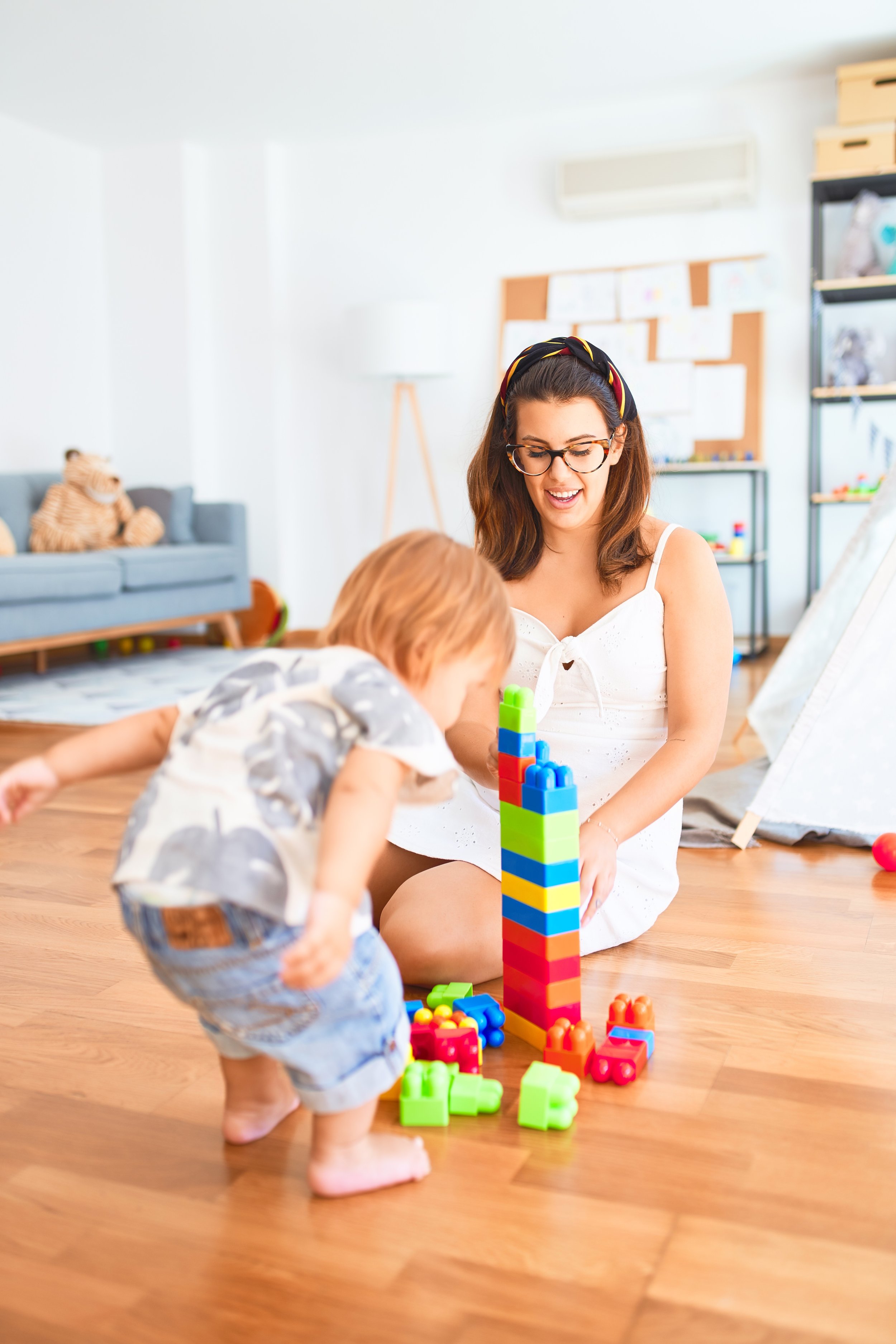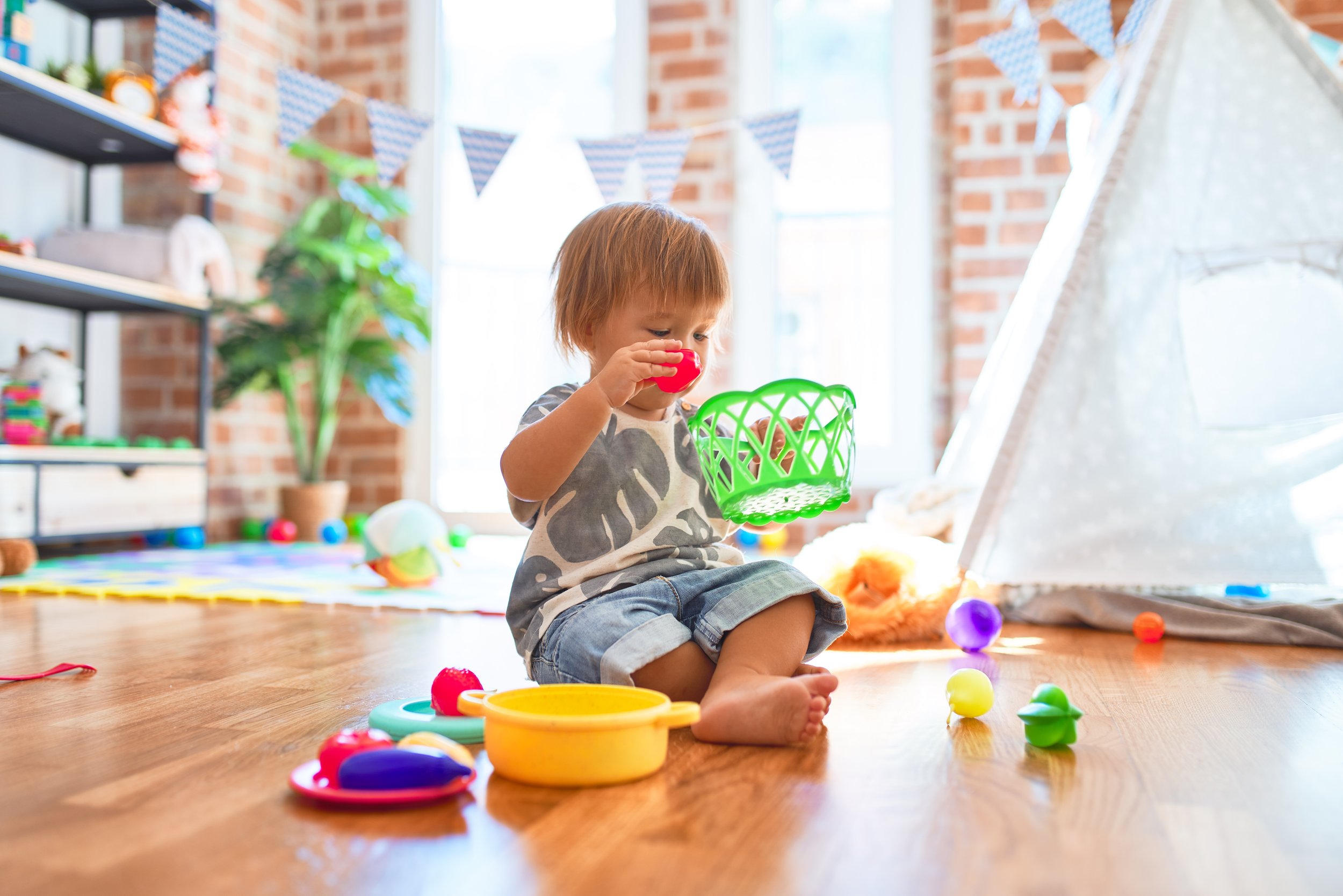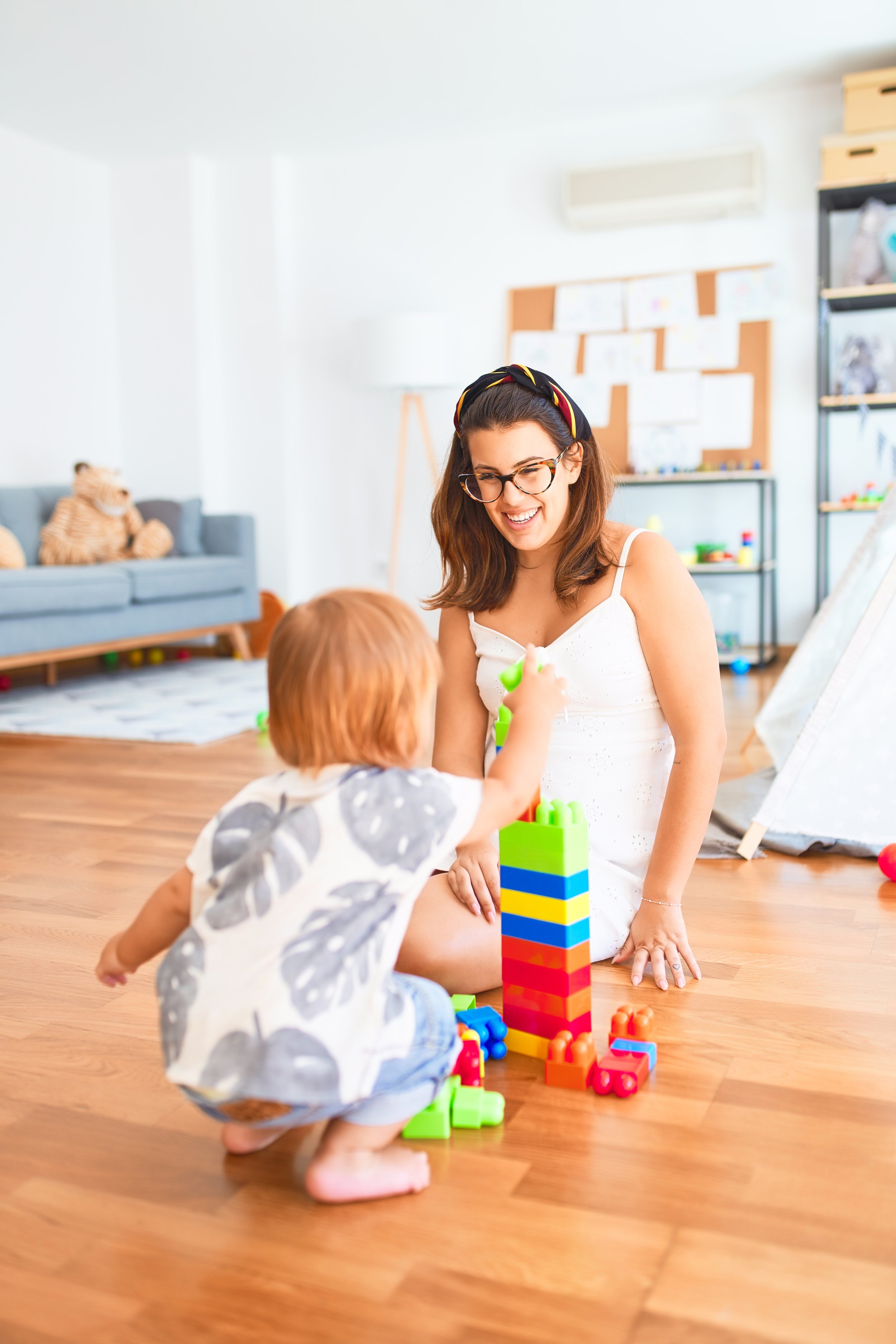My 14 month old doesn’t talk... Should I be worried?
Most babies will say their first word between the ages of 10 to 14 months; that’s a pretty big range.
14 Month Old Not Talking
If your child is 14 months old and they haven’t said their first word yet, it doesn’t necessarily mean that something is wrong. It does however alert us that we should keep a close eye on the child’s communication development so we can support them if learning to talk is a little harder for them.
As a speech therapist, when I am talking with a parent whose 14 month old isn’t talking yet, here are some of the first things I ask the parents about:
Is your child on track in other areas of development?
Is your child babbling?
Does your child use gestures to communicate with you?
Was one of their brothers or sisters delayed in their talking (only if they have siblings, of course)?
Parents’ answers to these questions help me make my best educated guess about how to best support an individual child and help them start talking. It’s important to get a clear picture of how a child is communicating so we can build upon the skills they have in order to reach the next milestone.
Keep in mind that every child is different, so when it comes to speech and language development there’s never a one size fits all.
Let’s dive into these key questions for 14 month olds who aren’t talking yet.
Is your child on track in other areas of development?
If your 14 month old doesn’t talk but they are on track in all other areas of development, it’s possible that they just haven’t gotten around to learning to talk yet (to put it simply). In this case they may or may not need some encouragement and support in speech development.
Each child has a limited amount of developmental energy they have to spend. If your child has spent a majority of their energy learning to walk, climb, and use their hands; they may not have had a ton of left over energy to dedicate to learning to talk.
To give you an idea of all the things a 14 month old is learning, I wanted to take a quick detour to talk about 14 month old milestones. Because your child isn’t just learning how to talk, it’s important to give them credit for all the cool things they are learning!
General 14 Month Old Milestones:
First word(s)
Understanding many more words than they can say
Walking on their own
Crawling up stairs
Holding a spoon and fork
Picking up small objects
Drinking from a cup
Learning to eat lots of different foods
For these active toddlers, it’s often a good idea to match words and fun sounds with actions to encourage them to talk. Two examples of this would be saying, “Whee!” while on the swing and “Go!” while pushing their toy car all over the house at mach speed.
Is your 14 month old babbling and just not talking yet?
Babbling is a good sign! It’s the precursor to talking.
If your 14 month old is babbling but not talking, it’s possible that they will say their first word on their own in a matter of a few days or weeks. But since we don’t have a crystal ball to see into the future, we don’t know if their first word will come tomorrow or in 2 months from now.
For 14 month olds who are babbling, I always encourage parents to try at home speech and language strategies to see if they can encourage that first word.
You can learn my 4 favorite speech therapy strategies for encouraging toddlers to say their first word here: The Foundations Of Speech Course For Parents - Free On YouTube!
And if your crunched for time, here is a 4 line summary of my favorite speech therapy strategies:
Pick a few specific words and repeat them often
Make sure your child can see your face so they can imitate you
Make more comment and ask less questions
Keep your child’s attention by following their lead in play
Does your child use gestures to communicate with you?
Just like babbling, using gestures to communicate comes before talking. If your child is using gestures to tell you what they want and need, we know that they are excited and motivated to communicate with you.
When supporting children who communicate with gestures I always take a 2 fold approach:
I encourage parents to continue teaching their little one new gestures
And use strategies to encourage children to imitate sounds and words
Baby sign language is one of the best ways to introduce new specific gestures to your child. It can often reduce toddler’s frustration when they are able to communicate specific wants and needs through baby sign language.
Related: How to use baby sign language with your toddler
While it’s best to see a speech therapist in person to identify the best strategies for your toddler; here are a few things you can try at home to encourage them to imitate your sounds and words:
Copy them!
Toddlers learn to talk through imitation. And when we copy sounds they make, we can show them how fun imitation can be. This is the perfect way to lead by example and show your child what you want them. to to.
Make animated sounds
Sounds like “Whee!” and “Uh-oh!” are some of toddler’s favorite words to repeat for two reasons. First, they are really fun to say and there’s no pressure with these words because we are just saying them for fun (rather than to get something we want). Second, we move our mouths a lot more than normal when we make animated sounds; and these exaggerate movements are easier for toddlers to copy!
Was one of your child’s siblings delayed in their speech and language development?
Just like red hair may run in your family (like it does in mine), there are also some genetic factors that influence our speech and language development. There is still so much research to be done in this area, but we do know that speech delay and other developmental disorders can run in families.
So, if your child has a sibling who had a language delay in their speech and language development it’s a good idea to keep an extra close eye on your other children’s communication development because they are at a higher risk to also be delayed in their communication development.
I like to use the medical terminology, like delay and disorder, because you will likely hear these words used at a speech therapy evaluation and in your doctor’s office and I don’t want it to totally take you by surprise.
I know hearing (or reading) the words, “delay,” “disorder” and “high risk” might give you that heart sinking feeling. It’s a normal and justified response when you care about your little one so deeply!
It’s important to know that when speech therapists and doctors use these terms it’s not personal and it’s not a judgment. These are the words that are used to help get insurance to pay for supports and services for toddlers, which is why it’s important to use them.
If the doctor says “I’m a little bit worried about Bobby’s speech and language development, but I think he will catch up in time.” the insurance isn’t going to pay for help. Whereas if the doctor says, “Bobby is at a high risk of a speech and language disorder” they are likely to pay for what Bobby needs to meet his milestones.
It’s the same observation, different wording and a much different outcome. They are using the words that are going to get your child the best help!
Keeping your child’s pediatrician in the loop!
It’s always a good idea to talk to your child’s pediatrician about your observations and concerns related to your child’s development of communication and all other skills. Your pediatrician knows your family personally and will be able to make personalized recommendations.
Because most children have said their first word by 14 months, your pediatrician may refer you to see a speech therapist. While you may not need to go to this appointment, it is ALWAYS a good idea to start the speech therapy process.
Unfortunately getting into speech therapy often takes time, sometimes even months!
You’ll need insurance approval for a speech therapy evaluation (1-2 weeks)
To schedule and have your speech therapy evaluation (a few weeks - a few months)
To get insurance approval for speech therapy (1-2 weeks)
And to wait for an open spot in the speech therapy schedule (a few weeks - a few months).
Remember, you can always cancel your appointment if you don’t need it (you may need to call a week in advance or so not to be fined), but it’s much harder to get scheduled in a hurry down the road.
These just in case appointments are life savers if your level of concern goes from a 3 to an 8 or 10 a few months from now!
To learn more about supports available for toddlers or the process for getting into speech therapy, you can read more here: How to find a speech therapist for my toddler
And to wrap things up, I wanted to share another 4 questions that parents also commonly ask about their 14 month olds.
-
Most children say their first word between the ages of 10 and 14 months old. If your child is 14 months or older and they haven’t said their first word yet, they may benefit from speech therapy.
You can continue reading here to learn more about how to find a speech therapist either through your child’s insurance or through your state’s early intervention program which provides free classes and support to toddlers - how to get started in speech therapy
-
If your 14 month old isn’t talking, you can help them grow their expressive language, or talking skills, by focusing on imitation.
First, have them copy things that you do when you’re playing together. For example, pushing a car along the floor, scribbling with chalk, or giving a kiss to their favorite stuffie.
Then, encourage them to copy your gestures, like clapping, blowing a kiss, waving, pointing, and baby sign language. Copying your gestures bridges the gap between copying your actions in play and copying the words you say.
Lastly, it’s time to encourage them to copy sounds and words that you say. Shorter words with less sounds are easier for them to repeat back in the beginning. Try practicing with words like “Uh-oh!” “Oh-no!” “Mama” “Papa” and “Dada” in the beginning.
-
Most babies will say their first word by the time they are 14 months old. If your 15 month old is not talking yet, it’s important to consult with their pediatrician who may recommend speech therapy to encourage your child’s emerging communication skills.
-
Babies usually say their first word between the ages of 10 months and 14 months. And first words are one of the developmental milestones people talk most about. If your child hasn’t said their first word yet a speech therapist can help identify the best strategies and activities to encourage them to talk. Speech therapy for toddlers is quite common; many toddlers need a little more explicit teaching when learning new words.
For ideas about how you might encourage your child to talk at home, check out this video that shows 3 at home speech therapy activities to help with first words.
-
Most 14 month olds will say somewhere between 1 to 50 words; anywhere within that range would be considered expected language development.
You May Also Enjoy:
Written By: Stephanie Keffer, MS CCC-SLP
© 2020-2025. Stephanie Keffer Hatleli, MS CCC-SLP. All Rights Reserved.
The content offered on ToddlerTalk.com is for informational purposes only. Toddler Talk is not engaged in rendering professional advice, whether medical or otherwise, to individual users or their children or families. No content on this site, regardless of date, should ever be used as a substitute for direct medical advice from your doctor, speech language pathologist, or other health professional. By accessing the content on ToddlerTalk.com, you acknowledge and agree that you are accepting the responsibility for your child’s health and well-being. In return for providing you with information related to home speech and language practice, you waive any claims that you or your child may have as a result of utilizing the content on ToddlerTalk.com.






